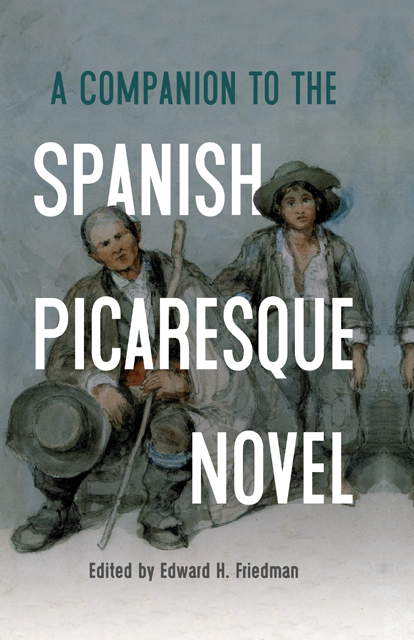Book contents
- Frontmatter
- Contents
- List of Illustrations
- List of Contributors
- Foreword
- 1 The Picaresque as a Genre
- 2 On the Picaresque and Its Origins
- 3 Francisco Delicado, La lozana andaluza
- 4 Lazarillo de Tormes
- 5 Mateo Alemán, Guzmán de Alfarache
- 6 Francisco de Quevedo, La vida del Buscón
- 7 La pícara Justina
- 8 Alonso Jerónimo de Salas Barbadillo, La hija de Celestina
- 9 Miguel de Cervantes and the Picaresque
- 10 Vicente Espinel, Marcos de Obregón
- 11 Carlos García, La desordenada codicia de los bienes agenos
- 12 Estebanillo González
- 13 Critical Approaches to the Picaresque
- 14 The Picaresque in Spanish America
- 15 Continuations: France and England
- 16 The Continuity of the Picaresque: Spain
- Bibliography
- Index
- Tamesis • Companions
5 - Mateo Alemán, Guzmán de Alfarache
Published online by Cambridge University Press: 11 January 2023
- Frontmatter
- Contents
- List of Illustrations
- List of Contributors
- Foreword
- 1 The Picaresque as a Genre
- 2 On the Picaresque and Its Origins
- 3 Francisco Delicado, La lozana andaluza
- 4 Lazarillo de Tormes
- 5 Mateo Alemán, Guzmán de Alfarache
- 6 Francisco de Quevedo, La vida del Buscón
- 7 La pícara Justina
- 8 Alonso Jerónimo de Salas Barbadillo, La hija de Celestina
- 9 Miguel de Cervantes and the Picaresque
- 10 Vicente Espinel, Marcos de Obregón
- 11 Carlos García, La desordenada codicia de los bienes agenos
- 12 Estebanillo González
- 13 Critical Approaches to the Picaresque
- 14 The Picaresque in Spanish America
- 15 Continuations: France and England
- 16 The Continuity of the Picaresque: Spain
- Bibliography
- Index
- Tamesis • Companions
Summary
Mateo Alemán (1547–1614?) was a businessman, bureaucrat, social reformer, and writer, best known as the author of the two-part Guzmán de Alfarache (1599, 1604). His other works are San Antonio de Padua (1603), Ortografía castellana (1609; Castilian Orthography), and Sucesos de fray García Guerra (1613; Events in the Life of Friar García Guerra), the latter two written after his emigration to Mexico in 1608. Son of the physician to the Royal Prison of Seville, Alemán studied medicine, worked for years in civil service, was once jailed in the very prison in which his father worked, and wrote a report on the conditions of prisoners condemned to row in the Spanish galleys. Throughout his works and private correspondence, he wrote about government reform, particularly in favor of the poor and disadvantaged. He was Miguel de Cervantes’s exact contemporary and one of his most serious competitors in the field of fiction in the early seventeenth century.
In this essay, I will place Guzmán de Alfarache in a series of contexts. The first context is that of the first quarter of the seventeenth century, the period of Guzmán’s greatest success. Then, after a look at exactly what the two parts of the novel entail, I will examine a second context, Alemán’s novel in Spain and the rest of Europe in the seventeenth century and afterward. Finally, the last context in which Guzmán will be placed is that of our own time: How do we read Alemán’s novel today? Where does it stand in the pantheon of great novels?
First Publication, Reception, Immediate Influence
The Primera parte de Guzmán de Alfarache (First Part of Guzmán de Alfarache) appeared in 1599 and was a sensation. It was published five times that year, eleven more times the next year, and seven more by 1605, for a record total of 23 editions within seven years (about half of them under the modified title of Primera parte de la vida del pícaro Guzmán de Alfarache; First Part of the Life of the Pícaro Guzmán de Alfarache). The work was immediately known among the avid reading public simply as El Pícaro. In 1602, Juan Martí, writing under the pseudonym of Mateo Luján de Sayavedra, published a sequel titled Segunda parte del pícaro Guzmán de Alfarache (Second Part of the Pícaro of Guzmán de Alfarache), which saw print ten times by 1604.
- Type
- Chapter
- Information
- A Companion to the Spanish Picaresque Novel , pp. 43 - 65Publisher: Boydell & BrewerPrint publication year: 2022



